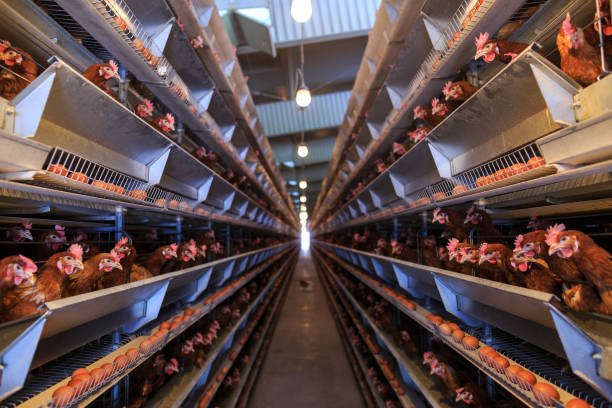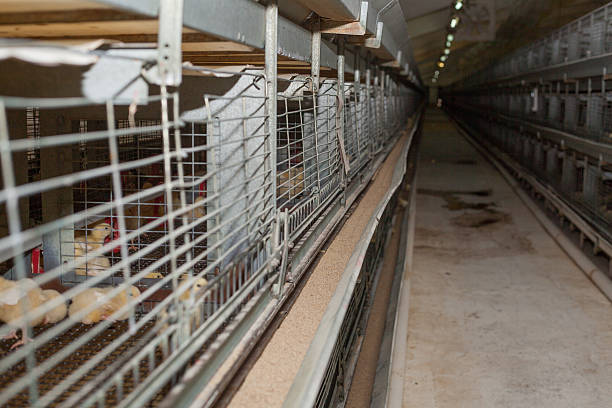What is fully automatic chicken cage equipment
Automated chicken farming equipment is a general term for special machinery, tools and internal facilities used by chicken farms in the production process of chicks, breeders, broilers and laying hens. Chicken farms can be divided into deep litter systems and cage systems. Specialized chicken farms are divided into original breeder farms, breeder farms, laying farms and broiler farms. Chicken farming equipment includes: automatic cage system, automatic drinking water system, automatic feeding system, automatic egg collection system, automatic chicken manure cleaning system, automatic lighting equipment, and automatic ventilation equipment.
Selection of equipment needed for chicken farming
- For a farm with 5,000 chickens, a semi-automatic layer cage system can be used. The semi-automatic cage can be 3-layer or 4-layer, the drinking water system is automatic, and the feeding system, egg collection system and feces cleaning system need to be manually operated
- For a farm with 5,000-20,000 chickens, most farmers prefer to use semi-automatic cages and some equipment to achieve full automation and save costs, such as automatic cart feeders, automatic manure scrapers, manure dryers, feed grinders
- If you want to start your chicken farm with a scale of more than 20,000 chickens, you can consider using the A-type fully automatic system. The A-type fully automatic cage can be 3-layer or 4-layer, which includes automatic layer cages, automatic drinking water systems, automatic feeding systems, automatic egg collection systems, automatic feces cleaning systems
- If you want to start your chicken farm with a scale of more than 30,000 chickens, you can consider using the H Fully automatic system to save land, H cage type can be 3-layer, 4-layer or 5-layer, including automatic laying hen cage, automatic drinking water system, automatic feeding system, automatic egg collection system, automatic manure cleaning system

Issues that need to be paid attention to when raising chickens
- The operating density of the chicken farm should be moderate, the stocking density should be moderate, each layer should have enough troughs and waterers, the location should be appropriate, and clean water should be provided to the chickens regularly. The water temperature should be suitable for drinking, and the chickens should be fed regularly every day. During the rising period of egg production, attention should be paid to timely increasing the nutritional level of the daily diet
- Reduce egg pollution and try to reduce egg pollution and damage. Environmental conditions should be stable or gradual. Closed chicken houses should turn on and off lights on time so that the daily light hours can be supplemented as needed. In addition, ventilation should be adjusted according to the season to make the indoor temperature more suitable
- Open chicken houses should pay attention to the impact of sudden bad weather on chickens. Regardless of the type of chicken house, appropriate insulation or cooling measures should be taken to prevent colds and heat strokes, and prevent the relative humidity and harmful gas concentration in the chicken house from exceeding the limit indicators, so as to ensure the health of the chickens. Chickens can maintain a high and stable egg production
Prevention is the key to chicken diseases
- Carry out daily observations to keep track of the health of the chickens at all times. Observe and record the basic conditions of the chickens every day, such as feed intake, drinking performance, chicken manure, spirit, activity, breathing, etc., and count the incidence and mortality of the chickens, so as to achieve early detection, early diagnosis, and early treatment of chicken diseases to reduce economic losses
- Strict disinfection. Chicken farms, chicken houses, chicken house entrances and exits, eggs, feeding equipment, drinking equipment, and feces must be disinfected. Feeding equipment includes troughs, cage troughs, egg racks, egg boxes, etc. The troughs must be rinsed regularly, otherwise the feed will mold and deteriorate. The drinking troughs must be cleaned every day, and the feces must be disinfected. The feces are often piled up and fermented, and the biological heat generated is used for disinfection
- Be sure to do a good job of chicken immunization. Immunization refers to the injection or oral administration of biological vaccines and other agents to enhance the resistance of chickens to pathogens, thereby avoiding the occurrence and prevalence of specific diseases. At the same time, the antibodies produced by the breeder after vaccination can also be passed to the chicks through the fertilized eggs to provide protective maternal antibodies. Therefore, special attention should be paid to the immunization of chickens







